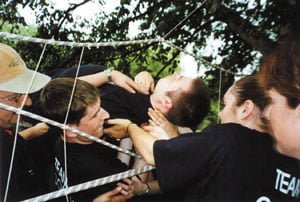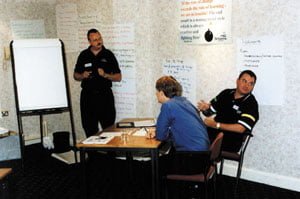
- other countries’ products are becoming increasingly sophisticated
- international trade in services is set to grow
- modern products need a well-educated, well-informed workforce to produce them
- other countries are willing to spend money on developing knowledge and expertise across a broad spectrum of industries
- knowledge, skill and creativity give companies a competitive edge.
In today’s high-tech world, organisations need the intellectual capital of their employees every bit as much as they need physical capital. In previous, more heavily industrial eras it was largely machinery, supported by large labour forces, that drove processes. Today, with industrial processes becoming increasingly sophisticated and with service industries growing in importance, people’s intellectual and creative capabilities do much to enable a business to identify, manage and satisfy customer requirements. In the past few years, the financial services sector has seen more changes than most other industrial sectors. It has had to cope with:
- increased levels of competition
- mergers and takeovers
- the impact of new technology
- new regulatory regimes
- changing patterns of consumer demand
- pressure on prices and profit margins.
These pressures have obliged the industry to review and change the way it operates, and to develop an organisational culture that is able to meet these new conditions. This case study looks at how one leading financial services company, Britannic Assurance, has met the challenge by setting up a management development programme: Management Forum. This was established to help managers respond to change by making them more strategic in thought and action. The programme was intended not only to benefit the individuals concerned, but also the whole organisation.
Britannic Assurance
Britannic Assurance has more than 130 years’ experience in financial services. It operates within a business environment that is heavily regulated. In the past, the development of managers in the financial sector focused largely upon how managers should supervise; managers learned to be tactical operators.
This short-term approach to management meant that managers concerned themselves with immediate ‘here and now’ issues, rather than on the ongoing long-term development of the business. Managing for the short-term meant that managers tended to treat all employees in a similar fashion. This in turn affected staff motivation and blunted staff commitment to the organisation. As a result, insurance companies and the like put their own futures under threat. Management Forum was set up to put right many of these failings.

- additional matters on which they should be focusing as part of their own development
- provide an opportunity for managers to find out about other areas of the business
- make employees more marketable and improve their employability both to Britannic Assurance and other organisations.
Effective management development achieves at least two purposes. It improves the ways in which a business is managed and it develops the potential of employees. By helping to eliminate a blinkered approach to people and by broadening the possibilities and horizons of employees, it also makes an organisation more attractive to its own employees.

and then encouraging them to reflect upon those experiences and make critical, considered choices about how best to respond.
Experiential learning can be viewed as part of a cycle. Within this cycle, learning starts with a concrete experience, which involves responding to events and to direct experiences. Experiential learning cannot take place without reflection. Reflection involves having the ability to think about these concrete experiences in relation to the job role and the workplace. Making choices involves integrating experience and reflective thoughts into decision-making. Application involves putting theories into practice to see how they work and this creates further experience.
It is important to appreciate that, within this process of experiential learning, most people have preferred learning styles as defined by Peter Honey and Alan Mumford. For example:
- Activists – respond immediately to concrete experiences without spending too much time reflecting.
- Reflectors – will be less action-orientated and will spend time on observation and on mulling over their reflections.
- Theorists – will constantly be assembling ideas based upon their reflections.
- Pragmatists – will be concerned about putting new ideas into practice.
Management Forum set up a range of active, enjoyable simulations that helped people to recognise their preferred learning styles and to develop their ability to use less preferred learning styles. The programme also helped managers within Britannic to respond to change by managing and controlling their experiences, rather than letting experiences manage and control them.
Organisations are as unique as nations and societies. The culture of an organisation is influenced by many different factors such as its history, ownership, size, use of technology, the business environment in which it operates and the people it employs. Cultures develop and change over time. Clues to an organisation’s culture come from:
- ways in which decisions are made
- the rules and procedures laid down
- the written and/or assumed dress codes adopted
- the communication of the mission or vision
- work relationships and functions.
This culture exerts a pressure on individuals within the organisation to behave in a particular way. For example, some organisations are characterised by power, where control rests with small groups of individuals, while other organisations create very distinct, job-enriching roles for employees. Modern organisations often try to create flexibility by developing a more task-based culture that encourages individuals to join teams, to contribute to decision making processes and to take ownership of their ideas. Britannic Assurance has used Management Forum as a way of bringing about cultural change.
Evidence shows that 80% of programmes aimed at bringing about cultural change fail because employees resist them either actively or passively, do not modify their behaviour and fail to move on in thought or action. It was important therefore, to sustain a process of cultural change that would move the organisation away from a rigid, bureaucratic, top-down hierarchical structure with a command and control approach to management within which middle managers had little part to play in long-term decision-making. Britannic Assurance recognised the need to encourage managers to develop more democratic styles of leadership that would enable them to become better leaders who are able to understand and then meet both their own and their employees’ motivational needs within the workplace.
Management Forum provided a theoretical basis to help managers within Britannic Assurance to develop their understanding of their own motives as well as those of the people they managed. They learned that some people strive for achievement, status and power, while others are more concerned with financial benefits. It is important, therefore, for managers to understand the motives of each employee and treat them accordingly. There has been extensive research into motivation and the behaviour of people at work. One of the most widely quoted theories to provide an insight into people’s needs is that of Abraham Maslow. Maslow’s study of human behaviour led him to devise a hierarchy of needs, with basic needs at the bottom and higher needs at the top.
He claimed that people seek to satisfy a low level of need before moving on to a higher need and that as they move up the hierarchy people become more ‘complete’ as they enjoy their work more and feel a greater involvement with, and commitment to, their employer.
Within the workplace, an individual’s basic physiological needs to provide shelter, warmth, food and sleep for the family will be met by factors such as the wage, working conditions, sick pay and contract. Security needs, such as guarantee of employment and physical safety will be met with a pension, sick pay, a safe workplace and a reliable income. Social needs involve relationships and a sense of belonging within an organisation. These involve the companionship of others, becoming involved with group activities and being accepted by others.
Self-esteem needs stem from a need for individuals to feel recognised as individuals and have their efforts noticed. Job title, responsibility, promotion and decision-taking opportunities help people to feel satisfied and develop their self-confidence. Finally, self actualisation needs are concerned with personal development and the opportunity that individuals have to be creative in order to develop their full potential. Being offered interesting, challenging work that tests skills and talents certainly helps individuals to gain a sense of achievement.

To support the management development process, Britannic Assurance introduced a series of reinforcement tools to help managers with their learning. For example, a learning resource library was set up from which managers could access a range of reference materials. A team of coaches was employed throughout the business to help others with their own development, often on a one-to-one basis. Training helps someone to work at acquiring a required skill, whereas coaching involves helping someone to do better at something they can already do.
Management Forum
Management Forum did more than help managers to become more flexible and adaptable. It also empowered them to make more strategic decisions focused upon consumers. The creative element of the process was designed to move Britannic Assurance towards becoming a learning organisation that would remove the top-down, employer-led culture and establish instead a culture that would:
- empower managers to use their skills to motivate others
- encourage all employees to become actively involved in decision-making processes
- foster ongoing staff development.
In an economy that has become increasingly dependent upon the actions of knowledge-based organisations in a rapidly changing business environment, the programme has been instrumental in helping Britannic Assurance to strengthen its own competitive position.
